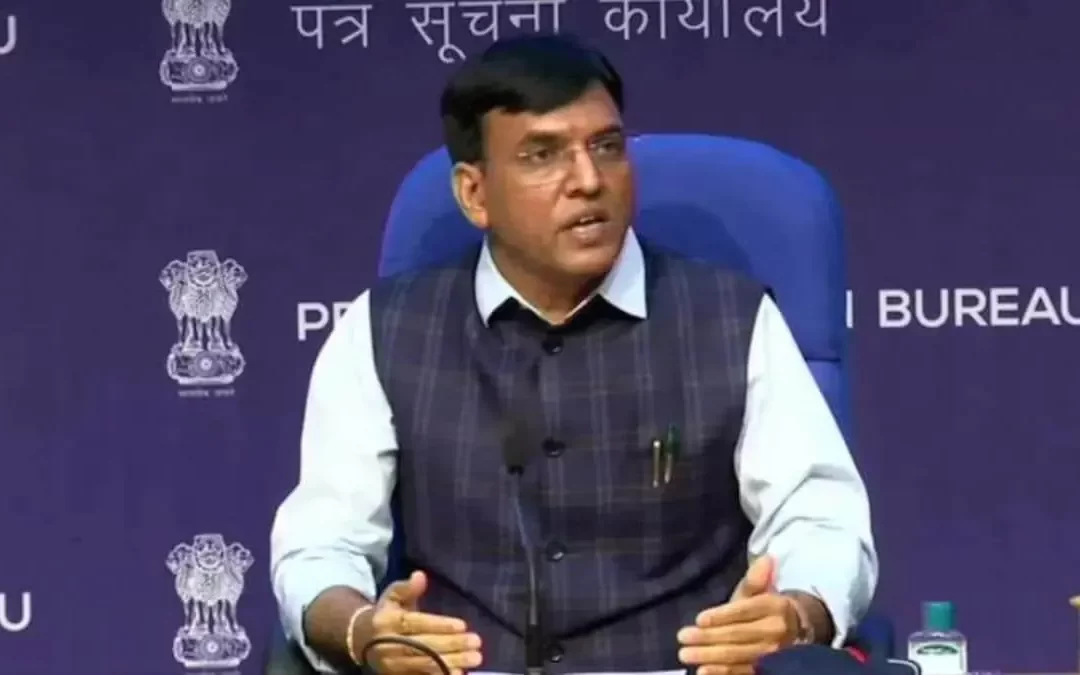Union Health and Family Welfare Minister Mansukh Mandaviya
”A health fair is organised every week at every primary health and wellness centre in the state. Two and a half to three lakh poor people are treated at such fairs. We will implement this model in the whole country. We will implement the e-Rupee scheme in the entire country so that beneficiaries directly get money,” Mandaviya said
Lucknow/New Delhi:
Union Health and Family Welfare Minister Mansukh Mandaviya on Wednesday said that the Centre will emulate Uttar Pradesh model of health fairs across the country.
”A health fair is organised every week at every primary health and wellness centre in the state. Two and a half to three lakh poor people are treated at such fairs. We will implement this model in the whole country,” Mandaviya said at a press conference after a meeting with Chief Minister Yogi Adityanath and officials of the state health department.
”The UP government has created a digital platform for vaccination which is very good. It has prepared a portal to get information about the utilisation of operation theatres in all hospitals, we will implement that too at the national level,” the Union minister said.
He said that the UP government is the first among state governments to be using e-rupee in the health sector.
”We will implement the e-Rupee scheme in the entire country so that beneficiaries directly get money.”
The minister also said though the COVID pandemic has ended in the country, there were still isolated cases and there was still a need to be cautious.
Asked about the possibility of absorbing scientists and technicians temporarily kept during the COVID pandemic and later removed, the minister said ”If the government has to use them, they will be used.”
On the shortage of doctors in government hospitals, Mandaviya said seats in medical colleges have been increased but it will take five years before those under training join the workforce.
The minister said that according to the National Health Policy, by the year 2025, 2.5 per cent of the country’s gross domestic product has to be spent on health services, he said.
He said last year he met officials from some hospitals who suggested to him ways to better link health facilities with the Ayushman Bharat scheme and he has since worked on their suggestions.
”If we encourage and enlist good hospitals, then the implementation of the Ayushman Bharat scheme can be done efficiently,” he said.
At the same event, Adityanath said that before 2014, state governments used to rush to Delhi only to be ignored, unlike today, when Union ministers are going to the states asking how much funds they need for the implementation of schemes.
”The aim of all of us is to provide complete health facilities to the person standing on the last rung,” the CM said.
Healthcare facilities offered to different socio-economic groups need to be of same quality
Meanwhile, Union Minister of State for Health S P Singh Baghel said he medical treatment and healthcare facilities being offered to different socio-economic segments of society need to be of the same quality.
He said even as India’s healthcare ecosystem has reached the digital age, it should be of paramount importance to offer affordable medical treatment facilities to the 80 crore underprivileged rural people.
Baghel was addressing the ‘Digital Health Summit’, organised by Internet and Mobile Association of India (IAMAI) in Delhi.
He stressed that medical treatment and healthcare facilities being offered to different socio-economic segments of society need to be of the same quality.
Emphasising on bringing healthcare facilities to the poorest of the poor in the country, the minister underlined the importance of the ‘Ayushman Bharat Card’.
Data security of medical records for rural populations was another critical area that needed to be looked into very closely, he said.
For this, a strong regulatory body must be in place to further strengthen the sector, he added.
IAMAI presented the first edition of the Digital Health Summit 2023, a conference dedicated to exploring the transformative potential of technology in achieving ‘Digital Health for all’ in India. The theme of the conference was ”Positioning India as a Global Leader in Digital Healthcare”.
Speaking at the inaugural session, Prashant Tandon, chief executive officer, TATA 1mg, and chair, IAMAI Healthtech Committee, said this was India’s opportunity to create new healthcare models that will be followed internationally.
The tech capacity in India, he pointed out, was very strong and the quality and quantities of data — AI, ML, data security — all of these gave India the unique opportunity to lead from the front.
Dr Alexander Kuruvilla, chief health strategy officer, Practo and co-chair, IAMAI Healthtech Committee, said India was poised to become a global leader in digital healthcare with new-age surgical care and other schemes being in practice.

